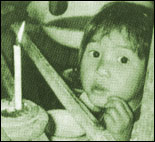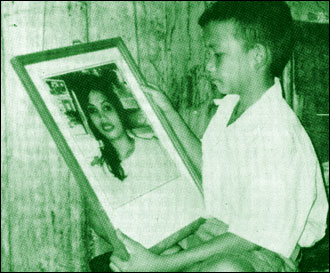

The devastation wrought by the HIV/AIDS pandemic extends well beyond the people who contract the virus. One of the cruelties of AIDS is that if one parent in a family has the disease, it is not uncommon for the other parent to become infected. World health officials who monitor the spread of AIDS now also track the number of children who are orphaned by it.
According to the UNICEF, about 14 million children under age 15 had one or both parents lost to AIDS through 2001. That figure is expected to soar to 25 million by 2010.
 When parents become seriously ill, families suffer economically. Children may be forced to quit school and go to work. After the parents die, relatives are often ill-prepared to take on the added financial responsibility. As the pandemic progresses, many children are orphaned again when the relatives who take them in become infected and die.
When parents become seriously ill, families suffer economically. Children may be forced to quit school and go to work. After the parents die, relatives are often ill-prepared to take on the added financial responsibility. As the pandemic progresses, many children are orphaned again when the relatives who take them in become infected and die.
In addition to suffering from the psychological trauma of losing their parents, many of the orphans are ostracized because of the stigma their communities attach to AIDS. Without an education and forced to fend for themselves, they become vulnerable to exploitation or abuse. According to UNAIDS, most of the world's AIDS orphans live in Asia and sub-Saharan Africa . The number of orphans is larger than Asia, but the proportion is much greater in Africa . It's estimated that by 2010, as many as25 percent of children in some African countries will be orphans, half of them because of AIDS.
Rotarians are finding ways to support AIDS orphans by reestablishing stability in their lives in the form of housing, education, and the means to achieve self-sufficiency.
In South Africa , where more than four million people live with HIV or AIDS, the Rotary Club of Kimberly supports Thusong Kids Haven, a home for street children. Experts estimate there are more 400,000 AIDS orphans in South Africa , leading to massive numbers of children fending for themselves on the street.
Thusong Kids Haven is run by Rebecca Tsiane. Eight years ago, Tsiane noticed a boy searching for food in a garbage can. That inspired her to open a facility big enough to house a small group of street children.
 Today, with support from the Kimberly Clubs and other community organization, Thusong Kids Haven is to 130 children who occupy three building, with a fourth being added. Since the home's inception, more than 200 children have been returned to their families or placed in foster homes after benefiting from the regular meals, education, discipline, and love dispensed by Havenstaff.
Today, with support from the Kimberly Clubs and other community organization, Thusong Kids Haven is to 130 children who occupy three building, with a fourth being added. Since the home's inception, more than 200 children have been returned to their families or placed in foster homes after benefiting from the regular meals, education, discipline, and love dispensed by Havenstaff.
“All of the kids help out, raising vegetables, repairing bikes to make money” says Jim Graham, a member of the Rotary Club of Brownsburg, Ind., USA, who recently led a Group Study Exchange (GSE) team to South Africa.
The Kimberly club provides a wide range of support, including supplying weekly shipments of bread and arranging scholarships for two of the children. A Rotary Foundation Marching Grant with the Rotary club Kota Baru, Malaysia , paid the beds and bedding.
Graham says his GSE team members were so moved by the work being done at the home that they pledged $500 and challenged the Brownsburg club to apply for a Matching Grant. Graham has since spoken to nearly 40 clubs in an effort to drum up more long-term support for Thusong Kids Haven.
![]() Read more by subscribing!
Read more by subscribing!
![]() Discuss this article here
Discuss this article here